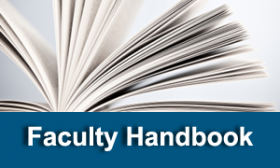
Faculty Handbooks: 5 Common Problems and Recommended Solutions
Outdated faculty handbooks limit institutional flexibility and can create significant liabilities. Within the past five years, has your institution reviewed its faculty policies to ensure that they are:
- Compliant with the Title IX/Dear Colleague Letter and ADA?
- Consistent with your current organizational structure?
- Consistent with your board’s bylaws?
This online training highlights real-life situations. Using case study scenarios, you will receive practical dos and don’ts to help you update your handbook.
Learning Objectives
- Outline five common problems with faculty handbooks
- Identify solutions to help you update your faculty handbook
- Apply practical solutions to address each issue
- Learn how to begin the process of updating your faculty handbook through specific examples and recommendations
Agenda
- A Brief Overview of Common Problems with Faculty Handbooks
- Outdated handbook models
- Contractual issues, costs, and morale implications
- Outline of Common Problems and Solutions
- Common problem #1: Inconsistent appointment letters and using handbooks as contracts
- Common problem #2: Failure to define essential terms
- Key terms to define
- Alignment with institutional policies
- Common problem #3: Inconsistent tenure standards, discipline/dismissal procedures, and appeal/grievance provisions
- Articulating key provisions
- Ensuring early intervention
- Consistency with shared governance
- Common problem #4: Unworkable/Obsolete/Illegal provisions including amendment limitations
- Streamlining the handbook
- Ensuring compliance with current laws
- Common Problem #5: Unnecessary or inappropriate material (including common provisions that should not be included in the handbook)
- Next Steps/Final Q&A
- Setting a schedule/timeframe
- Involving faculty
Speaker

Ellen M. Babbitt
Partner, Franczek Radelet
Ms. Babbitt, is a private practice attorney in Chicago, Illinois, has over thirty years of experience as a counselor, litigator, and appellate advocate. Since 1991, she has concentrated on the representation of colleges, universities, and other institutions of higher learning. She regularly assists educational institutions and their administrators in drafting and updating institutional policies, including board bylaws, faculty handbooks, academic integrity policies, faculty codes of conduct, grievance procedures, ADA accommodation processes, and other compliance protocols. Ms. Babbitt has extensive experience representing institutions in government investigations, lawsuits, and administrative proceedings scrutinizing compliance with statutory, governance, contractual, and accreditation requirements. Her practice encompasses work on behalf of public and private institutions, including graduate and professional schools, universities, colleges, religious schools, and museums.
Ms. Babbitt currently serves on the board of directors of the National Association of College and University Attorneys (NACUA). She frequently presents at conferences, seminars, and webinars sponsored by NACUA, the American Council on Education, and other higher education policy associations, addressing significant legal issues affecting higher education.
Available Credit
- 1.50 CE Contact Hour(s)

 Facebook
Facebook X
X LinkedIn
LinkedIn Forward
Forward